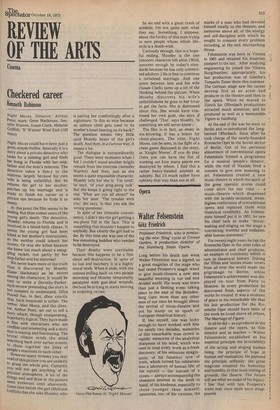Cinema
Checkered career
Kenneth Robinson
Night Moves. Director: Arthur Penn; stars: Gene Hackman, Jennifer Warren, Susan Clark, Melanie Griffith. 'X' Warner West End (105 mins).
Night Moves could have been just a good, simple thriller. Basically it is a story about a private detective who looks for a missing girl and finds her living in Florida with her stepfather and the man's mistress. The detective takes a fancy to the mistress, largely because his own Wife is being unfaithful. But he returns the girl to her mother, Patches up his marriage and is ready to finish his career as a Private eye because he finds it so messy.
At this point the film seems to be ending. But then comes news of the Young girl's death. The detective, Moseby, returns to Florida and is involved in a blood-bath climax. It seems the young girl had been killed at her mother's instructions, SO the mother could inherit her money. Or was she killed because She knew too much about a smuggling racket, run partly by her step-father and his mistress?
We never learn more of the truth than is discovered by Moseby (Gene Hackman) as he moves among the characters. It would be easy to write a Dorothy-Parkerstyle review pretending the story is too complex to understand. Dilys Powell has, in fact, done exactly that Such treatment is unfair. The Writer, Alan Sharp, and the director, Arthur Penn, set out to tell a story which, though exasperating, is Perfectly logical. They have made a film with characters who are credible and interesting and a story that is teasing and fascinating. The brutal climax sends the mind searching back over earlier events, to chain together the links of People's reactions to each other.
However many reviews you may read of this picture you are unlikely to grasp the whole plot. Certainly You will not get anything of its peculiar atmosphere. A lot of the things said and done in the picture seem irrelevant until afterwards. Some time before the girl (Melainie Griffith) dies she asks Moseby, who is patting her comfortingly after a nightmare: 'Is this so nice because an unborn child gets used to its mother's heart beating on its back?' The question means very little until Moseby hears of the girl's death. And then, in a curious way, it means a lot.
The dialogue is extraordinarily good. There were moments when I felt I couldn't stand another bright remark from the mistress (Jennifer Warren). And then, just as she seems a quite impossible character, Moseby tells her she is. 'I'm tired', he says, 'of your ping-pong talk' But she keeps it going right to the end. 'What are you all about?' he asks her later. 'The trouble with you', she says, 'is that you ask the wrong questions'.
In spite of her tiresome conversation, I didn't like the girl getting a sea-plane full in the face. This is something that shouldn't happen to anybody. But clearly the girl had to die. By this time she was one of the few remaining baddies who needed to be destroyed.
Their deaths were inevitable because this happens to be a film about self-destruction. In spite of its lust and butchery it is a highly moral work. When it ends, with the camera pulling back on two people drowning and Moseby temporarily paralysed with gun-shot wounds, the boat he is lying in starts moving in widening circles. So we end with a great crash of symbols. I'm not quite sure what they say. Something, I suppose, about the futility of this man trying to save people whose whole lifestyle is a death-wish.
Curiously enough, this is a hopeful ending. Moseby is the one innocent character left alive. (Well, innocent enough by today's standards because he has only committed adultery.) He is free to continue a reclaimed marriage. And one scene between him and his wife (Susan Clark) sums up a lot of the thinking behind the picture. When Moseby discovers his wife's unfaithfulness he goes to her lover to get the facts. She is distressed about this. She would have confessed her own guilt, she says, if challenged. 'That', says Moseby, 'is something we will never know'.
The film is in fact, an essay in not-knowing. It has a bonus for chess-players. The title, Night Moves, can be seen, in the light of a chess game discussed in the story, as 'Knight Moves'. If you do play chess you can have the fun of working out how many pieces are destroyed by whom. I find this a rather heavy-handed attempt at subtlety. But I'd much rather have subtlety that way than not at all.


































 Previous page
Previous page